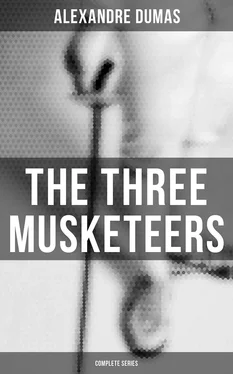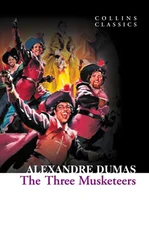Upon which M. d’Artagnan the elder girded his own sword round his son, kissed him tenderly on both cheeks, and gave him his benediction.
On leaving the paternal chamber, the young man found his mother, who was waiting for him with the famous recipe of which the counsels we have just repeated would necessitate frequent employment. The adieux were on this side longer and more tender than they had been on the other—not that M. d’Artagnan did not love his son, who was his only offspring, but M. d’Artagnan was a man, and he would have considered it unworthy of a man to give way to his feelings; whereas Mme. d’Artagnan was a woman, and still more, a mother. She wept abundantly; and—let us speak it to the praise of M. d’Artagnan the younger—notwithstanding the efforts he made to remain firm, as a future Musketeer ought, nature prevailed, and he shed many tears, of which he succeeded with great difficulty in concealing the half.
The same day the young man set forward on his journey, furnished with the three paternal gifts, which consisted, as we have said, of fifteen crowns, the horse, and the letter for M. de Treville—the counsels being thrown into the bargain.
With such a VADE MECUM d’Artagnan was morally and physically an exact copy of the hero of Cervantes, to whom we so happily compared him when our duty of an historian placed us under the necessity of sketching his portrait. Don Quixote took windmills for giants, and sheep for armies; d’Artagnan took every smile for an insult, and every look as a provocation—whence it resulted that from Tarbes to Meung his fist was constantly doubled, or his hand on the hilt of his sword; and yet the fist did not descend upon any jaw, nor did the sword issue from its scabbard. It was not that the sight of the wretched pony did not excite numerous smiles on the countenances of passers-by; but as against the side of this pony rattled a sword of respectable length, and as over this sword gleamed an eye rather ferocious than haughty, these passers-by repressed their hilarity, or if hilarity prevailed over prudence, they endeavored to laugh only on one side, like the masks of the ancients. D’Artagnan, then, remained majestic and intact in his susceptibility, till he came to this unlucky city of Meung.
But there, as he was alighting from his horse at the gate of the Jolly Miller, without anyone—host, waiter, or hostler—coming to hold his stirrup or take his horse, d’Artagnan spied, though an open window on the ground floor, a gentleman, well-made and of good carriage, although of rather a stern countenance, talking with two persons who appeared to listen to him with respect. d’Artagnan fancied quite naturally, according to his custom, that he must be the object of their conversation, and listened. This time d’Artagnan was only in part mistaken; he himself was not in question, but his horse was. The gentleman appeared to be enumerating all his qualities to his auditors; and, as I have said, the auditors seeming to have great deference for the narrator, they every moment burst into fits of laughter. Now, as a half-smile was sufficient to awaken the irascibility of the young man, the effect produced upon him by this vociferous mirth may be easily imagined.
Nevertheless, d’Artagnan was desirous of examining the appearance of this impertinent personage who ridiculed him. He fixed his haughty eye upon the stranger, and perceived a man of from forty to forty-five years of age, with black and piercing eyes, pale complexion, a strongly marked nose, and a black and well-shaped mustache. He was dressed in a doublet and hose of a violet color, with aiguillettes of the same color, without any other ornaments than the customary slashes, through which the shirt appeared. This doublet and hose, though new, were creased, like traveling clothes for a long time packed in a portmanteau. d’Artagnan made all these remarks with the rapidity of a most minute observer, and doubtless from an instinctive feeling that this stranger was destined to have a great influence over his future life.
Now, as at the moment in which d’Artagnan fixed his eyes upon the gentleman in the violet doublet, the gentleman made one of his most knowing and profound remarks respecting the Bearnese pony, his two auditors laughed even louder than before, and he himself, though contrary to his custom, allowed a pale smile (if I may allowed to use such an expression) to stray over his countenance. This time there could be no doubt; d’Artagnan was really insulted. Full, then, of this conviction, he pulled his cap down over his eyes, and endeavoring to copy some of the court airs he had picked up in Gascony among young traveling nobles, he advanced with one hand on the hilt of his sword and the other resting on his hip. Unfortunately, as he advanced, his anger increased at every step; and instead of the proper and lofty speech he had prepared as a prelude to his challenge, he found nothing at the tip of his tongue but a gross personality, which he accompanied with a furious gesture.
“I say, sir, you sir, who are hiding yourself behind that shutter—yes, you, sir, tell me what you are laughing at, and we will laugh together!”
The gentleman raised his eyes slowly from the nag to his cavalier, as if he required some time to ascertain whether it could be to him that such strange reproaches were addressed; then, when he could not possibly entertain any doubt of the matter, his eyebrows slightly bent, and with an accent of irony and insolence impossible to be described, he replied to d’Artagnan, “I was not speaking to you, sir.”
“But I am speaking to you!” replied the young man, additionally exasperated with this mixture of insolence and good manners, of politeness and scorn.
The stranger looked at him again with a slight smile, and retiring from the window, came out of the hostelry with a slow step, and placed himself before the horse, within two paces of d’Artagnan. His quiet manner and the ironical expression of his countenance redoubled the mirth of the persons with whom he had been talking, and who still remained at the window.
D’Artagnan, seeing him approach, drew his sword a foot out of the scabbard.
“This horse is decidedly, or rather has been in his youth, a buttercup,” resumed the stranger, continuing the remarks he had begun, and addressing himself to his auditors at the window, without paying the least attention to the exasperation of d’Artagnan, who, however placed himself between him and them. “It is a color very well known in botany, but till the present time very rare among horses.”
“There are people who laugh at the horse that would not dare to laugh at the master,” cried the young emulator of the furious Treville.
“I do not often laugh, sir,” replied the stranger, “as you may perceive by the expression of my countenance; but nevertheless I retain the privilege of laughing when I please.”
“And I,” cried d’Artagnan, “will allow no man to laugh when it displeases me!”
“Indeed, sir,” continued the stranger, more calm than ever; “well, that is perfectly right!” and turning on his heel, was about to re-enter the hostelry by the front gate, beneath which d’Artagnan on arriving had observed a saddled horse.
But, d’Artagnan was not of a character to allow a man to escape him thus who had the insolence to ridicule him. He drew his sword entirely from the scabbard, and followed him, crying, “Turn, turn, Master Joker, lest I strike you behind!”
“Strike me!” said the other, turning on his heels, and surveying the young man with as much astonishment as contempt. “Why, my good fellow, you must be mad!” Then, in a suppressed tone, as if speaking to himself, “This is annoying,” continued he. “What a godsend this would be for his Majesty, who is seeking everywhere for brave fellows to recruit for his Musketeers!”
Читать дальше












